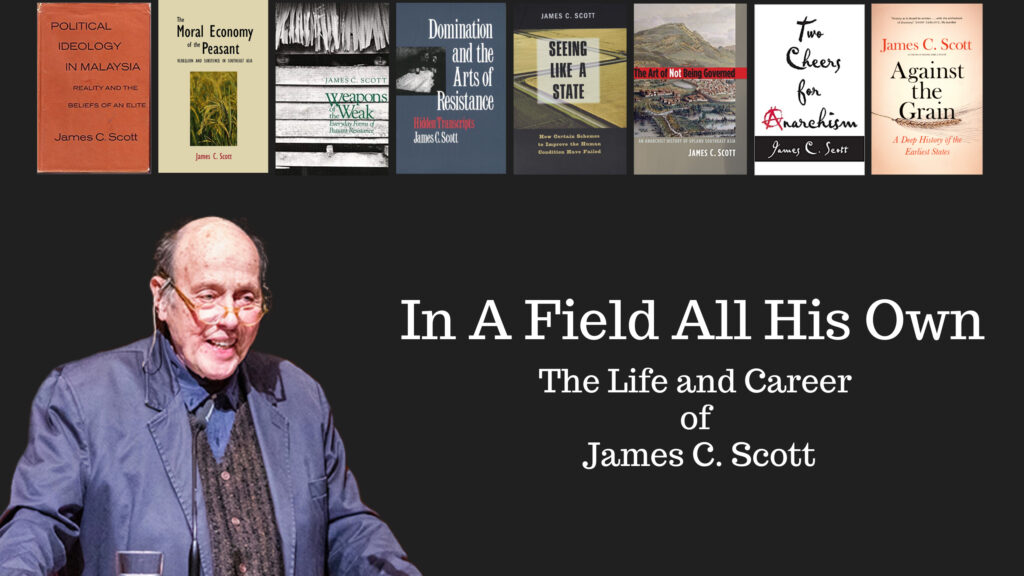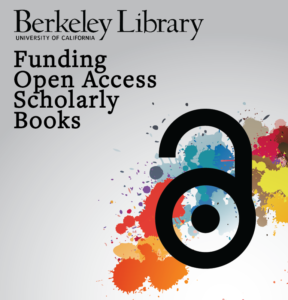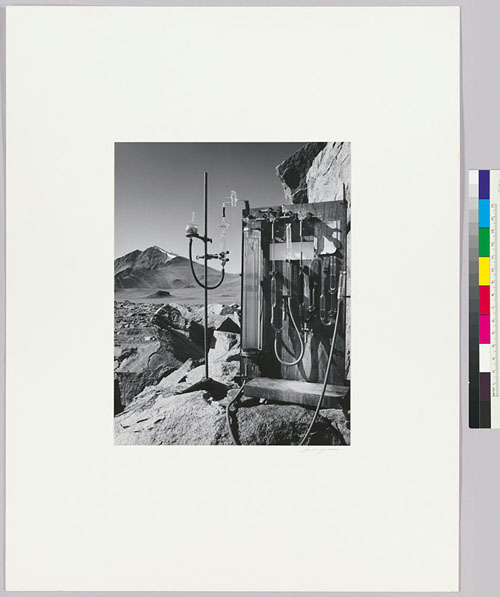Tag: humanities
Oral History Center Releases Documentary on Famed Yale Social Scientist James C. Scott
In A Field All His Own: The Life and Career of James C. Scott
“James C. Scott is regarded by many as one of the most influential thinkers of our time.”
The Oral History Center at UC Berkeley is proud to release, In A Field All His Own: The Life and Career of James C. Scott, a documentary that offers an unprecedented look at the famed Yale political scientist. Created and produced by UC Berkeley Oral History Center (OHC) historian Todd Holmes, the film draws from nearly thirty hours of oral history interviews with Scott and affiliated scholars at Yale and UC Berkeley to trace the intellectual journey of the award-winning social scientist from his childhood in New Jersey through each of the ground-breaking works he produced throughout his accomplished career. Overall, the film presents an intellectual biography of one of the world’s preeminent academics, a feature that will serve as a treasured resource for students and scholars around the globe.

While intellectual biographies may not be a typical genre, Scott is far from a typical academic. Over the last fifty years, few scholars have achieved such prominence within the American academy as James C. Scott. The Sterling Professor of Political Science at Yale University, with appointments in anthropology and the school of forestry and environmental studies, he is regarded by many as one of the most influential thinkers of our time. Throughout his career, his scholarship became a series of major interventions that impacted dozens of disciplines across the humanities and social sciences. From the strategic rhythms of peasant life to notions of resistance and the functioning of the modern state, his work continually shaped and reshaped research agendas and discourses in the academy. By his retirement in 2022, Scott stood as one the most widely read social scientists in the world – an influence and distinction that placed him, as the film title suggests, “in a field all his own.”
The idea for the documentary developed out of the Yale Agrarian Studies Oral History Project, which Holmes conducted between 2018 and 2020. The focus of that project was to document the career of James C. Scott, as well as the thirty-year history of the renowned Yale Agrarian Studies Program he founded. Those oral history interviews, which the OHC released in 2021, served as the basis for the film. Holmes had worked for both Scott and the Agrarian Studies Program during his graduate studies at Yale. His motivation for both the project and documentary was to capture Scott’s story—in his own words—for future generations. As Holmes recalls, “I had the privilege of meeting and working with Jim Scott before ever reading Jim Scott, a unique vantage point that allowed me to develop a deep appreciation for the brilliant scholar behind the books—his limitless curiosity, his wit and humor, and the welcoming nature of his intellect. I wanted to capture these qualities in telling his story. His books will be read for generations to come; it was my hope that this film could serve as a companion and allow students and scholars to get to know James C. Scott and the inspiration behind his work.”
The film was made possible through the generous support of Yale University’s Program in Agrarian Studies, InterAsia Initiative, and Council on Southeast Asia Studies. It was produced by Todd Holmes in association with the UC Berkeley Oral History Center and Teidi Productions, a digital creations label he operates with his partner Heidi Holmes. The film is available to the public via YouTube.
About the Oral History Center
The Oral History Center of The Bancroft Library preserves voices of people from all walks of life, with varying political perspectives, national origins, and ethnic backgrounds. We are committed to open access and our oral histories and interpretive materials are available online at no cost to scholars and the public. You can find our oral histories from the search feature on our home page. Search by name, keyword, and several other criteria. Sign up for our monthly newsletter featuring think pieces, new releases, podcasts, Q&As, and everything oral history. Access the most recent articles from our home page or go straight to our blog home.
Now available: Open educational resource of Building Legal Literacies for Text Data Mining
Last summer we hosted the Building Legal Literacies for Text Data Mining institute. We welcomed 32 digital humanities researchers and professionals to the weeklong virtual training, with the goal to empower them to confidently navigate law, policy, ethics, and risk within digital humanities text data mining (TDM) projects. Building Legal Literacies for Text Data Mining (Building LLTDM) was made possible through a grant from the National Endowment for the Humanities.
Since the remote institute in June 2020, the participants and project team reconvened in February 2021 to discuss how participants had been thinking about, performing, or supporting TDM in their home institutions and projects with the law and policy literacies in mind.
To maximize the reach and impact of Building LLTDM, we have now published a comprehensive open educational resource (OER) of the contents of the institute. The OER covers copyright (both U.S. and international law), technological protection measures, privacy, and ethical considerations. It also helps other digital humanities professionals and researchers run their own similar institutes by describing in detail how we developed and delivered programming (including our pedagogical reflections and take-aways), and includes ideas for hosting shorter literacy teaching sessions. The resource (available as a web-book or in downloadable formats including PDF and EPUB) is in the public domain under the CC0 Public Domain Dedication, meaning it can be accessed, reused, and repurposed without restriction.
In addition to the OER, we’ve also published a white paper that describes the institute’s origins and goals, project overview and activities, and reflections and possible follow-on actions.
Thank you to the National Endowment for the Humanities, the project team, institute participants, and staff at the UC Berkeley Library for making Building LLTDM a success.
[Note: this content is cross-posted on the LLTDM blog.]
Library will fund publishing of open access scholarly books
 The Library is expanding the Berkeley Research Impact Initiative (BRII) program so that Berkeley authors can publish scholarly books open access at zero or substantially reduced costs—making these books free and accessible to readers around the globe.
The Library is expanding the Berkeley Research Impact Initiative (BRII) program so that Berkeley authors can publish scholarly books open access at zero or substantially reduced costs—making these books free and accessible to readers around the globe.
The BRII program fosters broad public access to the work of Berkeley scholars by encouraging the Berkeley community to take advantage of open access (OA) publishing opportunities. OA literature is free, digital, and available to anyone online. With barrier-free access, researchers and decision-makers from anywhere in the world can read the scholarly output of UC Berkeley authors.
“OA publishing is helping us advance the relevance and reach of our science so that it can get in front of the people who need to be seeing it, and who are in a position to act upon the results of our research in ways that we as scientists alone can’t,” says Rachel Morello-Frosch, UC Berkeley Professor of Environmental Science, Policy and Management. “BRII helped me make access to my research affordable and it wiped away a lot of barriers.”
Morello-Frosch has published several articles OA using BRII funds. The funds are applied toward article processing charges (APCs), which many journal publishers impose on authors and which can range from $750-$3500 or more. These fees serve to replace revenue the publisher would have generated via library subscriptions if access to the journal had been licensed by the library for campus readers. BRII began in 2008 by redirecting a small amount of Library collections funds to help authors cover these APCs for open access journals so that Berkeley authors could participate in the wider dissemination that OA publishing offers.
While many scholars in the humanities and social sciences publish in OA journals, they also publish scholarly books, termed “monographs”. These books become a critical component of professional credentialing, yet their readership is limited by the same kinds of access barriers endemic to subscription-based journals: The scholarly books are quite expensive, and increasingly fewer libraries can afford to purchase them. By expanding BRII to also cover the publishing fees for OA books, BRII can help Berkeley authors publish long-form scholarship that can be read by anyone at no cost.
These digital editions of peer-reviewed and professionally edited OA books typically offer readers more than just the text itself. Digital monographs can also incorporate multimedia with the text, include annotation and commenting tools, and provide platforms that further encourage the development of innovative scholarship.
University presses’ funding models for financing OA books are innovative and evolving. UC Press’ Luminos program, for instance, is formulated as a partnership in which costs and benefits are shared by member organizations. Many academic publishers also offer a print or print-on-demand version of the book for sale to readers who prefer hard copies, further enabling cost recovery through traditional print sales. Some publishers have found that making the book available OA not only drives up digital readership but also print sales, too.
At their core, most OA book funding models typically charge academic authors the equivalent of an APC. Yet, given the greater investment needed to create and edit longer and more complex manuscripts, the book processing charges (BPCs) can range upwards of $7000. This sum can be out-of-reach for humanities and social sciences authors if available funding sources do not adequately cover research and publication needs.
To address this situation, in this first pilot year of funding BPCs, BRII will offer $7500 a piece in publishing fees for up to three OA scholarly books.
“The expanded BRII program will support increased OA publishing by Berkeley humanists and social scientists, and augment the reach of their work,” explains University Librarian Jeffrey MacKie-Mason. “We aim to democratize scholarly publishing by lowering access barriers and increasing Berkeley impact, and subvention funding for OA books allows us to do just that.”
To learn more about the expanded BRII program, please see the updated BRII guide. With questions about obtaining BRII funding, contact openaccess@lists.berkeley.edu.
Digital Humanities and the Library
 Are you a humanist working with digital materials to do your research? Are you carrying out your research or presenting your results using digital methods and tools? Are you teaching using digital tools and content? If you answered yes to any of these questions, then your work might be considered digital humanities.
Are you a humanist working with digital materials to do your research? Are you carrying out your research or presenting your results using digital methods and tools? Are you teaching using digital tools and content? If you answered yes to any of these questions, then your work might be considered digital humanities.
Digital humanities has been described as “dynamic dialogue between emerging technology and humanistic inquiry” (Varner, 2016). It is a term that is used to describe a domain within the humanities where researchers are doing most of their work using digital tools, content, and/or methods. Whether this work is partially or exclusively digital, this designation is a way to set these emerging practices apart from more traditional or “analog” ones, though there is no clear distinction.
The scope of digital humanities has been a hot topic in recent years, especially in relation to the library’s role in this new domain. What services does the library provide to digital humanists? What can the library do to support digital humanities on campus?
The Library has always provided services to researchers and will continue to provide those same services, as well as to expand their offerings to encompass new forms of research, publication, and teaching. It is not a question of libraries supporting one or the other. Digital humanities is still evolving, and the Library is evolving right along with it, continuing to offer collections, research support, and instruction in both traditional ways and new ones as this “dynamic dialogue” expands.
The Library collects and creates digital resources at the same time that it continues to build its analog collections. Myriad databases, data sets, and other digital resources are available through the Library catalog and website. In addition, our digitized special collections are available through Calisphere, which provides access to digital images, texts, and recordings from California’s great libraries, archives, and museums.
While the library is busy collecting and organizing digital resources, reference librarians are ready and willing to provide you with research help. The expertise that librarians have in connecting researchers to materials, designing research, and providing instruction on how to evaluate and use new content and tools continues to grow and expand in this new environment.
In addition, the library provides instruction to help those new to the digital humanities to learn about tools and skills needed to do this work. Many librarians have partnered with the D-lab in Barrows Hall on campus to provide instruction on citation management, metadata, and research data management. The D-lab also offers training in various programming languages and data tools, as well as consulting on research design, data analysis, data management, and related techniques and technologies. Library trainings and events are generally posted to the library events calendar.
The Library also works closely with the Digital Humanities @ Berkeley group (a partnership between Research IT and the Office of the Dean of Arts and Humanities) which support digital humanities events, trainings, course support, and graduate student and faculty projects. Their calendar lists talks, workshops, and other events designed to help move the DH community on campus forward.
Keeping the “dynamic dialogue” of digital humanities moving forward is a campus goal, and the relationship between digital humanities and the Library is an evolving one. We are hiring new librarians with digital humanities skills to further develop this relationship and expect to see more growth in the scope of the library’s involvement in digital humanities as the community on campus continues to expand.
Mary W. Elings
Head of Digital Collection, The Bancroft Library
Contact me at melings [at] berkeley.edu

